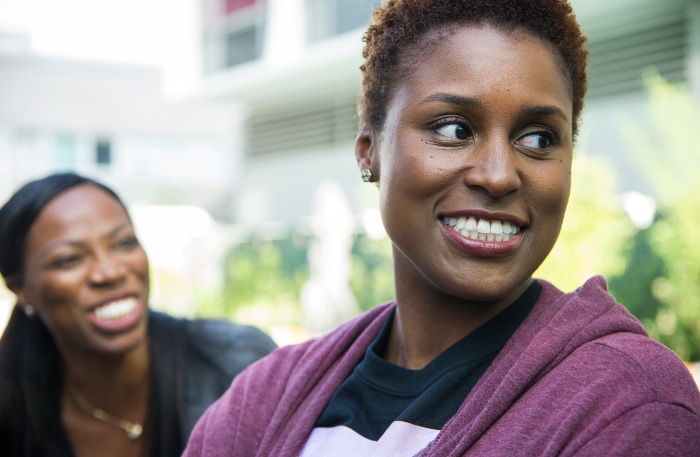
por HBO, traducción: Mariana y punto
Issa Rae es la creadora y protagonista de Insecure, nueva serie que se estrenará el 9 de octubre en HBO y que espero que mantenga la genialidad que vi en Issa y su webserie The Misadventures of Awkward Black Girl. Por las intenciones que demuestra en esta entrevista, confío que sí.
¿De dónde viene el nombre Insecure?
El nombre Insecure viene de la percepción de que las personas negras somos como superhéroes o supermujeres, sin fallas o fuertes, mágicos, y yo pensaba ¿qué pasa con el resto de nosotros que no somos nada de eso? ¿Cómo se ve lo que hay que hacer para llegar hasta ahí?
Yo amo a la gente con defectos, amo escuchar historias sobre cómo no tienes todo resuelto y logras encontrarte a ti mismo. Quiero ver ese camino, desde la inseguridad a la confianza.
Yo digo ahora que me siento segura dentro de mis inseguridades. Sé dónde están mis defectos, y está bien, porque yo soy yo. He aprendido a gustarme y amarme por lo que soy. El camino sigue, y yo sigo intentando ser mejor. Quiero ver ese viaje en los personajes.
Tu personaje en la serie tiene que lidiar con un tipo que no quiere estar en una relación todavía. Crees que eso es algo con lo que es fácil identificarse?
Al ser mujer tienes un reloj biológico y te sientes apurada, en cierto sentido, de encontrar a la persona con la que se supone que debieras estar. Los hombres tienen el lujo de decidir que quieren tener un hijo cuando tengan 72, y eso está bien, pero las mujeres no tienen ese lujo a menos que tengan plata y puedan congelar óvulos, entonces es frustrante. Yo quiero que las personas vean la serie y puedan decir: conozco eso, o yo soy esto, o he pasado por eso -y no tienes que ser una mujer de color o siquiera una mujer para poder decirlo.
Al ser una mujer negra, especialmente, tú sientes que los hombres tienen varias mujeres que siempre van a estar dispuestas para cuando ellos estén listos, y no es lo mismo para nosotras. Así que puede ser frustrante.
La serie definitivamente aborda ese sentimiento de presión y ansiedad: cuándo voy a encontrar a mi persona? Cuándo voy a enganchar con alguien? Algunas mujeres se sienten que sólo cuando eso pase su vida será completa y pueden seguir adelante -ya se preocuparon de eso y ahora pueden sacarlo de su lista de pendientes. Entonces tenemos a un personaje que está muy, muy, muy ansiosa por encontrar a esa persona.
Tú dices que crees que es particularmente un tema para las mujeres negras, ¿por qué?
Creo que nosotras estamos al fondo de la cadena del deseo, del tótem de las citas -no somos los trofeos. En la cultura del rap, especialmente, entre los hombres negros, siempre hay una discusión sobre que si alcanzas cierta cantidad de éxito, tu trofeo es la chica blanca de tu brazo, o lo que sea que no sea negra.
Es más que sólo una percepción -no está científicamente comprobado, pero empíricamente hay evidencia. En las aplicaciones de citas, somos las últimas en ser elegidas y las menos deseables y eso suma.
Tú creaste una webserie existosa antes de crear Insecure, y estoy segura de que has tenido dificultades en el camino. ¿Algunas de esas dificultades tienen que ver con que seas una mujer de color, crees?
Definitivamente ha sido un camino, un viaje con muchos obstáculos, pero mucho de eso es justamente el tema que quiero retratar. No quiero mostrar a personas negras siendo demasiado dramáticas, o tener historias de violencia, estar ambientada en el barrio, tener historias de esclavitud, donde hay peligros o dificultades esperándote; yo sólo quiero contar historias de gente negra normal. Quiero decir eso en el sentido de que la gente blanca común ve historias sobre ellos siempre. Hubo un tiempo en el que a nadie le interesaba realmente eso, y se volvió frustrante, porque ese es mi mundo, esos son mis amigos, y yo quiero contar historias sobre la gente que conozco, pero encuentro que esos momentos pequeños y comunes son muy interesantes. Me intrigan esos momentos porque están arraigados en la realidad y en la autenticidad.
Esta serie no va a encapsular en absoluto la experiencia completa de ser negro, y no les va a gustar ni va a identificar a todas las personas de color, y eso está bien. Mi único foco es asegurarme de que al final del día contamos una buena historia, algo que es auténtico y de verdad.
¿Te definirías como una ávida observadora del comportamiento humano?
Sí. Cien por ciento. Mucho de mi inseguridad viene de observar, no sólo de preocuparte por quién eres, sino también de cómo estás siendo percibido y cómo otras personas te ven. Por ejemplo, estás conversando con alguien, te presentas y te das cuenta de que no te acuerdas el nombre del otro porque estás siempre pensando: cómo me están mirando? Qué pasa? Cuál es la situación? Eso es parte de la naturaleza humana, y esos son los momentos que yo también amo, porque todos pasan por ese tipo de cosas.
Algunas de tus amigas quizás se reconozcan en la serie. ¿Les importará?
Una de mis mejores amigas es muy cercana a uno de los personajes, y le mandé el guión, y le dije lo que estábamos haciendo, y ella se sorprendió gratamente. Me dijo: me entiendes. Hay otras personas a las que no les he dicho que aparecen… ya se darán cuenta, y está bien. Ellos van a estar bien.
No puedes ser amigo o salir con una guionista, porque vas a terminar en el texto. Un montón de gente que conozco termina en el texto, de alguna manera. Todos nuestros guionistas contribuyeron con sus historias personales que terminaron en la serie de alguna manera o forma. Siento que así es como puedes mantenerlo real y aterrizado y auténtico. Ese es el tono de la serie.
¿Qué tan autobiográficas son las experiencias de tu personaje?
Nada, la verdad. El personaje soy yo si hubiera tomado otras decisiones en mi vida.
En los primeros capítulos vemos a algunos personajes trabajar increíblemente duro, sólo para que sus logros sean opacados cuando un colega se va a casar. ¿Es eso algo que te ha tocado presenciar o experimentar directamente?
Creo que para algunas personas hay un tema de status social. Lo consigues cuando te comprometes o casas, y eso opaca otros logros que puedas haber tenido. Y eso realmente apesta. Apesta ser una mujer que trabaja duro y ser buena -como nuestro personaje Molly que la lleva en el trabajo, superando las expectativas de todos, sólo para terminar viendo a la gente adular a su compañera que es mediocre pero que se va a casar. Es enfurecedor. Es injusto, pero es una dinámica real.
¿Tu percepción sobre la femineidad es algo con lo que te criaste, o algo que has creado tú misma?
Definitivamente es algo que he construido por mí misma. Mi mamá trató de imponer ciertas nociones específicas de femineidad en mí -quería que me celebrara a los 16 y que fuera a mi fiesta de graduación, y yo no hice ninguna de las dos cosas. Pero después tuvo a mi hermana chica que sí era, a sus ojos, la imagen de lo femenino. Creo que es algo que está en mí, simplemente ser un individuo.
¿Crees que la amistad entre mujeres es diferente a la amistad con hombres, en el sentido de que sean un apoyo?
Estoy cien por ciento de acuerdo. Las mujeres son mi vida, mis amigas son todo para mí, significan lo más importante. Perdí mi billetera hace dos días. Iba caminando y se me cayó en la calle. Me enteré de que había un tipo usando mis tarjetas par pagar por una cuenta de Square que tenía su nombre y dirección. Mis amigas y yo fuimos a su casa ayer. Ellas sólo dijeron: vamos a entrar a su casa, y te vamos a devolver tus cosas; tú quédate atrás, que nosotras lo vamos a enfrentar. Eso representa a mis amigas. Él no estaba en su casa eso sí, vamos a tener que ir de nuevo.
La serie está anunciada como una amistad entre dos mujeres negras. Tú crees que la amistad entre mujeres de color es diferente?
Creo que muchas de las representaciones populares de las relaciones entre mujeres negras han sido antagónicas, con muchas peleas y sillas volando, y yo quería mostrar que éstas son las amistades que existen realmente. No conozco a nadie que le tire sillas a otras personas, yo no peleo físicamente con mis amigas. Es simplemente una linda amistad y tenemos nuestras maneras de apoyarnos mutuamente, o de tirarnos para arriba. Quería que fuera una serie muy específica sobre amistad entre mujeres negras, pero esos elementos que se ven también son universales.
Tu personaje y su amiga Milly se dicen harto “perra” entre ustedes. ¿Qué le dirías a algún espectador que pueda encontrarlo ofensivo?
Ivonne Orji, la actriz que hace de Molly, decía que mientras leía el guión se preguntaba si eran realmente amigas. Después fue a una fiesta donde me vio interactuar con mis amigas, y ahí se dio cuenta de que estábamos diciéndolo, pero que nos queríamos, que así es como nos estimulábamos y levantábamos. Creo que es algo que culturalmente hemos aceptado y adaptado. Es lo mismo que, cuando se usa la palabra con n, es sólo una parte de cómo hablamos, que usamos para tener un efecto cómico. Es sólo una forma de acentuar elogios o retos entre nosotras. Expresiones de cariño.
Con series como Blackish y Fresh off the Boat, ¿tú crees que la televisión se está volviendo mejor o que representa más diversidad?
Creo que estamos mejorando detrás de escena, que es lo más importante. Guionistas, directores, creadores, ejecutivos… detrás de cámara guía a lo que pasa en cámara también. Sólo espero que no sea una moda. Pienso que como las cosas están cambiando detrás de escena no lo es.
¿Cómo reaccionó tu mamá ante la serie?
Ella vio el piloto por primera vez hace unas semanas. Hay mucho de lenguaje. Pero le gustó mucho. Me llamó a un lado, y me dijo: esa boca, la vamos a lavar, pero buen trabajo.
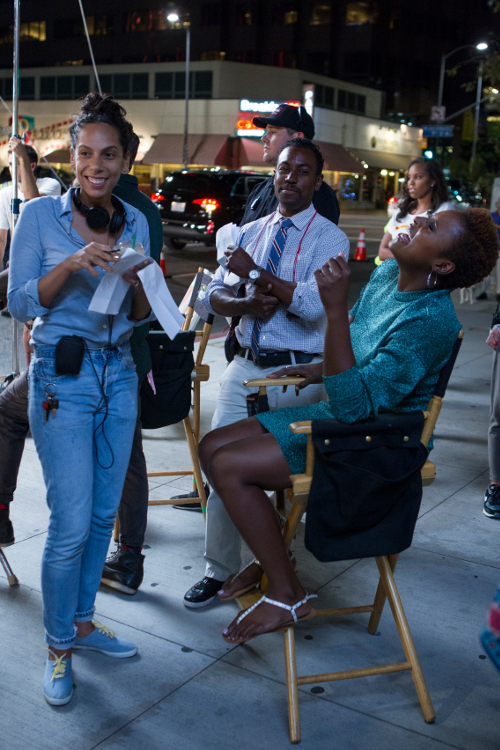
Por si prefieren leer la entrevista en idioma original, abajo la dejamos en inglés.
Q: Where did the title Insecure come from?
IR: The title Insecure came from the perception that black people are always flawless or fierce, like superheroes and superwomen, and magic, and being like, what about the rest of us who are none of those things? What does that journey look like to get there?
I love flawed people, I love hearing the stories about how you don’t have it together and then you find yourself. I want to see that journey – from insecure to confidence.
And I say now that I’m very confident in my insecurities. I know where my flaws lie, and it’s fine, because I’m me. I’ve learned to like love myself for who I am. The journey will continue, and I’m only going to try to get better. I want to see that journey with these characters.
Q: Your character in the show is having to deal with a guy who doesn’t want to have a relationship right now. Is that something you feel is easy to relate to?
IR: Being a woman, you’re on a biological clock and you feel rushed, in a sense, to find who you’re supposed to be with. Guys who have the luxury of being like, I can have a kid when I’m 72, and it’s fine, but women don’t have that luxury unless they’re rich and can freeze eggs, so it’s frustrating. I do want people to watch and to be able to say: oh, I know that, or I am that, or, I’ve been through that – and you don’t have to be a black woman or even a woman to say that.
Being a black woman, especially, you do feel that guys have a pool of women who will always be ready when they’re ready, and it’s not the same for us. So, it can be frustrating.
The show definitely tackles that feeling of pressure and anxiety: When am I going to find my person? When am I going to find my match? For some women, they feel like, then their life can be complete, they can move on – they handled that and can check that off. So we have a character who’s really, really, really anxious about finding her person.
Q: You’ve just said that you think that is particularly the case for black women – why is that?
IR: I think we’re at the bottom of the desire chain, of the dating totem pole – we’re not the trophies. In rap culture, especially, amongst black men, there’s always a discussion that once you achieve an amount of success, your trophy is the white girl on your arm, or anything but black.
It’s more than just a perception – it’s not scientifically proven, but empirically there’s evidence. In dating apps, we’re the last to be chosen and the least desirable and that adds up.
Q: You created a hit YouTube show before you created Insecure, and I’m sure you’ve had difficulties along the way. Do some of those difficulties also come from the fact that you are a black woman, do you think?
IR: For me it’s definitely been a road, a journey with various hurdles, but a lot of it is really the subject matter that I want to portray. I don’t want to portray black people being overly dramatic, or having the violence, being set in the hood, have a slave story, where there’s a plight against you; I just want to tell the stories of regular black people. I mean that in the sense that regular white people get stories about them all the time. For a while, nobody was really interested in that, and that became frustrating, because that’s my world, that’s my friends, and I want to tell stories about the people that I know – because I find those small, regular moments very interesting. I’m intrigued by those moments because they’re rooted in reality and authenticity.
This show will not at all encapsulate the entire black experience, and not every black person’s going to like it, or to relate to it, and that’s fine with me. My sole focus is making sure that at the end of the day we told a good story, something that’s authentic and real.
Q: Would you call yourself an avid observer of human behaviour?
IR: Yes. A hundred percent. A lot of my insecurity is observational – not only worrying about how you are, but also how you’re being perceived and how other people are perceiving you. For example, you’re having a conversation with someone, and you introduce yourself and you realize you never remember the person’s name because you’re always wondering: how are they looking at me, what’s going on, what’s the situation here? That’s just a general part of human nature, and those are the moments I also love, because everybody goes through those things.
Q: Some of your girlfriends might perhaps recognize themselves in the show – do they mind?
IR: One of my best friends is very close to one of the characters, and I sent her the script, and told her what we were doing – and she was pleasantly surprised. She said: you get me. There are other people who I did not tell that they’re in it – they’ll find out, and that’s fine. They’ll be okay.
You can’t be friends with a writer or date a writer, because you’re going to end up on the page. A lot of people I know end up on the page, in some way. All of our writers in the room contributed their own personal stories that ended up in the show in some way, shape or form. I feel like that’s how you keep it real and grounded and authentic. That’s very much the tone of this show.
Q: How autobiographical are your character’s experiences?
IR: Not at all, really. The character is me if I made different choices in life.
Q: In the first few episodes, we see some characters work incredibly hard, only for their achievements to be overshadowed when a colleague just gets engaged. Is that something you have witnessed and experienced directly?
IR: I think for some people there’s a societal status thing. You achieve when you get engaged or married, and that overshadows any other accomplishments you may have. And it really sucks. It sucks being a hardworking woman and killing it – like we have our character Molly who’s like killing it in the workplace and surpassing everybody’s expectations, only to see people fawn over her coworker, who’s mediocre, when she gets engaged. It’s just infuriating. It’s unfair, but it’s a real dynamic.
Q: Is your perception of femininity something that you grew up with, or something you have created for yourself?
IR: I think it’s definitely something that I built on my own. I did have my mother pushing specific notions of femininity on me – she wanted me to have a sweet 16 and go to prom, I did neither. But then she got my little sister who was, in her eyes, the picture of femininity. I think that’s just something that’s in me, just being an individual.
Q: Do you think female friendships are different to male friendships, in the sense that they are incredibly supportive?
IR: A agree with that a hundred percent. Women are my life – my female friendships are everything to me, they mean the most to me. I lost my wallet two days ago. I was walking and dropped it on the street. I found out this guy was using all my cards to pay for a Square account, it has his name and address on it. My friends and me went to his house, yesterday. They just said: we’re going to roll up at his house, and we going to get this back; you stay in the back, and we’re going to ask him a question. That embodies like a lot of my female friendships. He wasn’t home though, we’re going to go there again.
Q: The show is billed as a friendship between two black women – do you think black women’s friendships are different?
IR: I think a lot of the mainstream depiction of black female relations have been antagonistic, with lots of fighting and chair throwing, and I wanted to show that these are the friendships that are really out there. I don’t know anybody out there who throws chairs at other people, I don’t physically fight with my friends. It’s just a beautiful friendship and we have our own way of supporting each other, of uplifting each other. I wanted it to be a very specific show about black female friendship in and of itself, but those elements that you’ll see will also be universal.
Q: Your character and her friend, Molly, call each other ‘bitch’ a lot. What would you say to any potential audience members who might find that offensive?
IR: Yvonne Orji, the actress who plays Molly, was saying when she got the script, dang, are they actually friends? Then she came to a party where she saw my friends and I interact, and she was like, oh! They’re just saying it, they like each other, that’s how they boost each other up. I think it’s just something culturally that we’ve embraced and adapted. It’s the same thing, in a sense that, with the n word that we use, it’s just a part of how we talk, that we use for also comedic effect. It’s just an accent to compliments or put downs that we give to each other. A term of endearment.
Q: With shows like Blackish, and Fresh off the Boat, do you think TV’s getting a little better at representing diversity?
IR: I think we’re getting better behind the scenes, which is the most important thing. Writers, directors, creators, executives…and behind the scenes leads to in front of the camera, as well. I just hope that it’s not a trend. I think that because things are changing behind the scenes that it’s not.
Q: What’s your mother’s reaction to the show?
IR: She saw the pilot for the first time a couple of weeks ago. There’s a lot of language. But she really liked it. She pulled me aside, and she was like: That mouth, we’re going to wash it out, but good job.


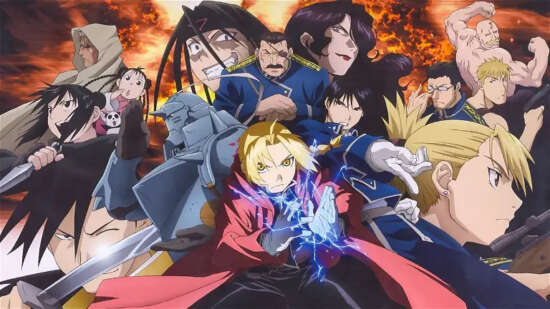
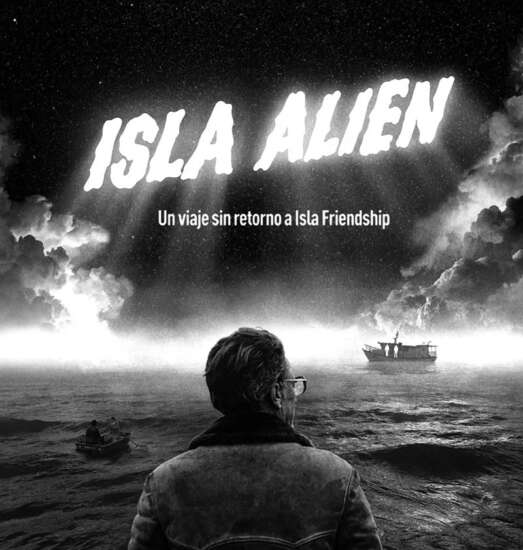
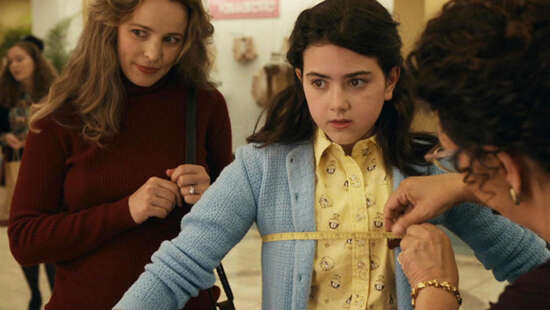
Buen post! me gustó y me deron ganas de ver la serie. ! gracias , un post interesante y con contenido :)